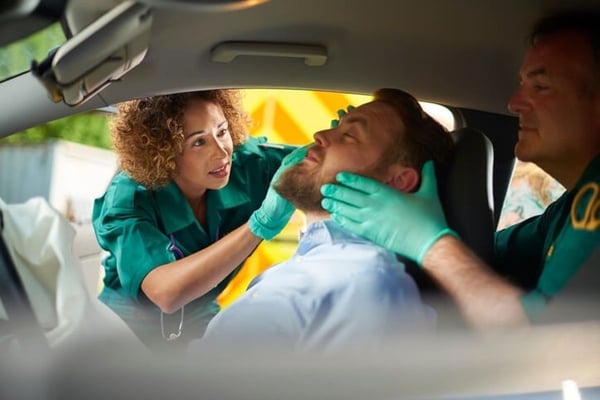How Long Will I Have Pain After My Accident?
Accident victims are forced to deal with hospitalization, medical treatments, missed work, and lost income, often while trying to manage pain and disability from their injuries.
Accident victims may also be asking How Long do you Have to See a Doctor or Personal Injury Attorney after a Car Accident?
In this blog, we discuss auto accident injury soreness and where to seek medical attention and pain relief.
Table of contents:
- Why Do We Experience Pain After an Accident?
- How Long Will I Be Sore After an Accident?
- How Serious Were Your Injuries?
- How Fast Were You Driving?
- Were You Wearing a Seat Belt?
- Do You Have Pre-Existing Conditions?
- Other Factors Influencing How Long You Will Be Sore After A Car Accident
- Chiropractic Treatments For Auto Accident Injuries
Why Do We Experience Pain After an Accident?
Pain after an accident is your body's natural response to trauma, signaling that something is wrong.
Different types of pain can manifest, each with unique characteristics:
- Sharp Pain: Often described as stabbing or shooting, this severe pain is spontaneous but typically subsides relatively quickly.
- Aching Pain: Common and persistent, aching pain may not be overly bothersome but can worsen with movement.
- Radiating Pain: This pain originates from one location and travels to other areas. Commonly seen in neck or back injuries, this pain may radiate down the arms or legs.
- Throbbing Pain: Characterized by a pulsating sensation at the injury site, this type of pain can cause extreme discomfort and is often a symptom of underlying issues.
Understanding the type of pain you're experiencing after an accident is crucial for seeking appropriate medical treatment and managing your recovery effectively.
How Long Will I Be Sore After a Car Accident?
How long you're sore after your car accident varies based on several factors:
- Severity of Injuries: More severe injuries typically result in longer-lasting soreness.
- Speed at Impact: Higher speeds can cause more severe injuries and prolonged soreness.
- Seatbelt Usage: Wearing a seatbelt can reduce the severity of injuries, potentially shortening the recovery time.
- Pre-Existing Conditions: Existing health issues can exacerbate injury recovery, leading to longer soreness.
- Medical Evaluation: Prompt medical attention from a doctor or chiropractor is crucial for an accurate diagnosis and treatment plan.
Car accident doctors will use diagnostic tools such as X-rays, neurological tests, MRIs, and range of motion tests to determine the nature of your injuries.
This will help them determine whether they are soft tissue injuries or structural issues like broken bones.
Based on the extent of your accident injuries, they can provide an estimated timeframe for your recovery and the alleviation of soreness so you can resume your normal activities.
How Serious Were Your Injuries?
The duration of pain and soreness after a car accident varies depending on the severity of your injuries.
Even minor car accidents can lead to pain and suffering.
For example, a rear-end collision with minimal vehicle damage can cause whiplash.
Whiplash is a neck injury resulting from the rapid back-and-forth motion of your neck.
While whiplash from a minor accident may not seem like a big deal, it can lead to chronic pain and disability for weeks or even months after the accident.
On average, recovery time for many accident injuries is about six weeks.
Still, some victims may feel back to normal sooner, while others may experience pain and suffering for a lifetime.
The extent of your soreness will depend on your injuries' recovery time and severity.
Injuries that can lead to significant recovery time and soreness include neck or back injuries, spinal cord injuries, and traumatic brain injuries.
Severe burns can also take several months to heal and may leave behind residual pain for a lifetime.

How Fast Were You Driving?
The speed at which you were driving plays a significant role in the severity of injuries sustained in a car accident.
High-speed collisions generally result in more severe or life-threatening injuries compared to low-speed accidents.
The gravitational force exerted on vehicle occupants during a collision is the combined speed of both vehicles.
For example, if you traveled 60 miles per hour and the other vehicle was 70 miles per hour, the total impact speed would be 130 miles per hour.
The higher the speed of the accident, the greater the force of impact, which can lead to more serious injuries.
These injuries often take longer to heal, resulting in prolonged soreness and discomfort.
It's important to consider the speed of the accident when evaluating the potential recovery time and the extent of medical treatment needed to address the injuries.
Were You Wearing a Seat belt?
Wearing a seatbelt is crucial for safety in a car accident, as it can significantly reduce the risk of severe and fatal injuries.
You should ALWAYS wear your seatbelt.
However, seatbelts can also contribute to specific injuries such as whiplash, abdominal wounds, organ damage, or respiratory problems.
Without a seatbelt, though, you may suffer more severe injuries, including broken bones or a traumatic brain injury, from the impact with the steering wheel, windshield, or side window.
While wearing a seatbelt can prevent life-threatening injuries, it may still result in muscle, ligament, and organ damage.
It's essential to understand the role of seatbelts in both protecting and potentially causing injuries to evaluate the recovery time and medical treatment needed for car accident injuries.
Do You Have Pre-Existing Conditions?
Pre-existing conditions play a crucial role in determining the duration of soreness after a car, truck, or motorcycle accident.
If you have existing neck or back pain, a car accident can exacerbate those injuries, affecting your recovery rate and range of motion.
That means that even with pre-existing conditions, you may still be eligible for financial recovery.
The at-fault party could be liable for accident-related damages, regardless of any prior injury or illness.
Therefore, it's essential to seek immediate medical care and consult with a personal injury attorney after your accident to ensure your rights are protected and you receive the appropriate medical treatment and compensation for your injuries.
.jpg?width=600&height=450&name=relieve-back-pain-after-a-car-accident%20(1).jpg)
Other Factors Influencing How Long You Will Be Sore After A Car Accident
Following an accident injury, there are several other factors can affect the duration and intensity of your soreness:
- Age: Younger individuals often recover quicker from common injuries than older adults due to better overall health and resilience.
- Overall Health: Maintaining a healthy lifestyle can influence how your body responds to a car accident. Pre-existing injuries like spinal injuries or chronic pain, can exacerbate things like neck pain and abdominal pain, leading to prolonged soreness.
- Position in the Vehicle: The impact of an accident varies depending on whether you were the driver, a front-seat passenger, or in the backseat. In frontal collisions, drivers may suffer more severe injuries due to airbag deployment, while rear-end collisions often result in more trauma for backseat passengers.
- Type of Accident: The nature of the accident, whether it's a minor fender bender, a rear-end collision, or a high-speed impact, plays a significant role in the severity of injuries and the resulting soreness.
- Medical Attention: Prompt and appropriate medical treatment, including physical therapies and chiropractic care even if you've only sustained minor injuries, can significantly influence your recovery time and reduce the duration of soreness.
- Psychological Factors: The psychological impact of an accident, such as stress and anxiety, can lead to a loss of enjoyment of life and exacerbate physical pain, prolonging the recovery process.
- Legal and Financial Stress: Dealing with insurance companies, medical expenses, and possibly a personal injury claim can add to the stress and impact your overall recovery.
- Lifestyle and Activity Level: Your daily activities and physical fitness level before the accident can affect your recovery. Engaging in regular physical activity and having a solid support system can aid in a quicker recovery.
- Adrenaline Rush: Immediately after an accident, an adrenaline rush can mask even extreme pain, leading to a delayed onset of muscle soreness.
It's important to remember that each individual's experience will differ, and there is no one-size-fits-all answer to how long you will be sore after a car accident.
Consulting with medical professionals and a personal injury attorney can provide guidance and support tailored to your situation.
Chiropractic Treatments for Auto Accident Injuries
Seeking medical attention promptly is crucial to understanding how long you will be sore after a car accident.
Chiropractors specializing in auto accident injuries can accurately assess the damage to your body and the expected recovery time.
In cases of severe injuries like a spinal cord injury or traumatic brain injury, immediate emergency room care is essential.
However, chiropractic care can be highly effective for pain management and rehabilitation.
The chiropractors at Arrowhead Clinic have over 40 years of experience in treating accident injuries, including common injuries like whiplash, soft tissue injuries, and spinal injuries.
During a free consultation, they will conduct a physical exam and develop a personalized treatment plan to help you regain full strength and range of motion.
This may include spinal adjustments, physical therapies, and massage therapy to alleviate pain and promote healing.
If your injury resulted from another driver's negligence, Arrowhead Clinic can also connect you with an experienced personal injury attorney to assist with filing a personal injury claim.
This can help you recover compensation for medical expenses, loss of enjoyment, and non-economic damages.
To get started with a specialist who can address your injuries or to seek legal assistance for a claim, schedule a free consultation with one of our car accident doctors today.
Next Blog: Most Common Injuries Associated with Rear-End Car Accidents



